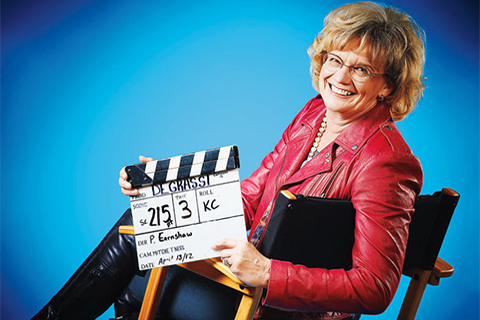Linda Schuyler has been in high school for more than 30 years. The teacher-turned-producer is the co-creator of the internationally acclaimed television franchise that includes Degrassi Junior High and Degrassi: The Next Generation (still going strong as Degrassi). In the fictional Toronto Degrassi schools, students feeling “shy and lonely” tackle everything from overly strict parents to drugs and alcohol, sex and sexuality. Schuyler studied film and media studies at Innis College, where she says she developed her passion for TV. A slew of industry honours and an Order of Canada and Ontario later, Schuyler opens up to Lisa Bryn Rundle about the tumultuous world of high school TV dramas and her new show, The L.A. Complex.
You started off as a teacher, how did that turn into creating the Degrassi empire?
I was so frustrated by not being able to find any audiovisual materials for my students. There was nothing for adolescents. Finally I just realized: Maybe I should make it.
Degrassi Junior High broke ground when it came to representing teens’ real struggles. Is there one moment you look back on and think “I can’t believe we did that?”
I think it happened in the first season when we had our pregnant teenager, Spike. [We realized] there hadn’t been an authentic portrayal of a pregnant teenager on television before.
With Degrassi (formerly Degrassi: The Next Generation) you’ve broken more ground. Is it easier now to tackle some issues?
I definitely find it easier to tell stories [now] about sexuality. And two years ago we introduced our first transgender character.
Is it significant that you’ve been based out of Canada this whole time?
This show could only have been made in Canada. There’s more pushback from the [U.S.] audience [on controversial issues] than there is here.
Why is having a reflection of teen life on television so important?
Because it gives young people assurance. We just had Chaz Bono up here doing a guest role. He runs a support group for transgender kids. He had one kid say to him: “Degrassi saved my life. I wanted to commit suicide and I saw the transgender character portrayed on television and I realized I was not alone.” That’s why I do what I do.
Your newest production is The L.A. Complex. It’s been praised by critics, but Slate ran a headline about it that read “Surprise! The Lowest-Rated Show in Broadcast History Is Actually Great.” Is it a sign fans don’t want smart shows?
I try not to read too much into it. We know we’re connecting in the digital world – even though we have that wonderful headline.
How do you make sense of that disparity?
Oh, you can’t make sense of it. It’s the turbulent world of television that we live in.
Recent Posts
For Greener Buildings, We Need to Rethink How We Construct Them
To meet its pledge to be carbon neutral by 2050, Canada needs to cut emissions from the construction industry. Architecture prof Kelly Doran has ideas
U of T’s 197th Birthday Quiz
Test your knowledge of all things U of T in honour of the university’s 197th anniversary on March 15!
Are Cold Plunges Good for You?
Research suggests they are, in three ways





